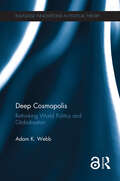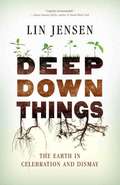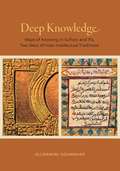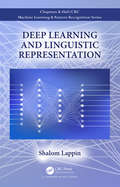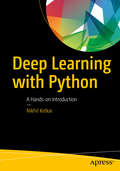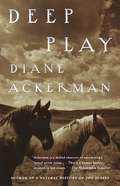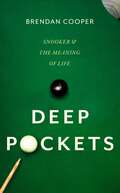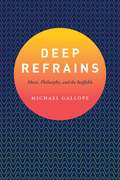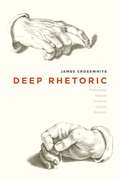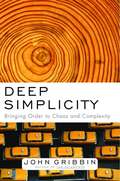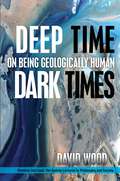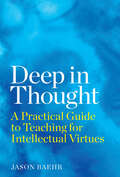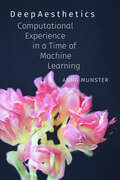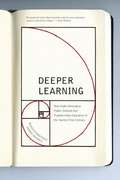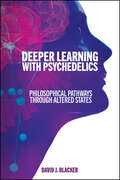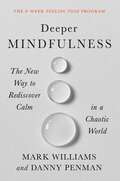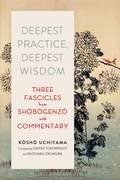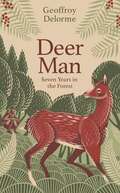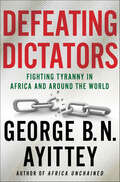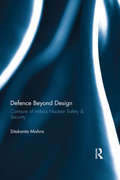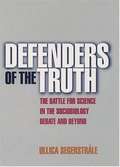- Table View
- List View
Deep Cosmopolis: Rethinking World Politics and Globalisation (Routledge Innovations in Political Theory)
by Adam K. WebbToo often, observers of globalization take for granted that the common ground across cultures is a thin layer of consumerism and perhaps human rights. If so, then anything deeper and more traditional would be placebound, and probably destined for the dustbin of history. But must this be so? Must we assume--as both liberals and traditionalists now tend to do--that one cannot be a cosmopolitan and take traditions seriously at the same time? This book offers a radically different argument about how traditions and global citizenship can meet, and suggests some important lessons for the contours of globalization in our own time.Adam K. Webb argues that if we look back before modernity, we find a very different line of thinking about what it means to take the whole world as one’s horizon. Digging into some fascinating currents of thought and practice in the ancient world, the Middle Ages, and the early modern period, across all major civilizations, Webb is able to reveal patterns of "deep cosmopolitanism", with its logic quite unlike that of liberal globalization today. In their more cosmopolitan moments, everyone from clerics to pilgrims to empire-builders was inclined to look for deep ethical parallels—points of contact—among civilizations and traditions. Once modernity swept aside the old civilizations, however, that promise was largely forgotten. We now have an impoverished view of what it means to embrace a tradition and even what kinds of conversations across traditions are possible. In part two, Webb draws out the lessons of deep cosmopolitanism for our own time. If revived, it has something to say about everything from the rise of new non-Western powers like China and India and what they offer the world, to religious tolerance, to global civil society, to cross-border migration.Deep Cosmopolis traces an alternative strand of cosmopolitan thinking that cuts across centuries and civilizations. It advances a new perspective on world history, and a distinctive vision of globalization for this century which has the real potential to resonate with us all.
Deep Down Things
by Lin JensenBeloved and critically acclaimed author Lin Jensen returns with this bounteous volume exploring what the poet Gerard Manley Hopkins calls "deep down things." Richly informed by deep ecology, Lin's writing explores our intimate connection to the land, to the specificities of place, and to the living earth itself-all as Lin uncovers our own deepest nature, the true heart of what it means to be human. There is much in what's happening in our environment now that can and perhaps should be cause for dismay - and Deep Down Things looks squarely at all of this and nonetheless gives us ample cause for celebration.
Deep Knowledge: Ways of Knowing in Sufism and Ifa, Two West African Intellectual Traditions (Africana Religions)
by Oludamini OgunnaikeThis book is an in-depth, comparative study of two of the most popular and influential intellectual and spiritual traditions of West Africa: Tijani Sufism and Ifa. Employing a unique methodological approach that thinks with and from—rather than merely about—these traditions, Oludamini Ogunnaike argues that they contain sophisticated epistemologies that provide practitioners with a comprehensive worldview and a way of crafting a meaningful life.Using theories belonging to the traditions themselves as well as contemporary oral and textual sources, Ogunnaike examines how both Sufism and Ifa answer the questions of what knowledge is, how it is acquired, and how it is verified. Or, more simply: What do you know? How did you come to know it? How do you know that you know? After analyzing Ifa and Sufism separately and on their own terms, the book compares them to each other and to certain features of academic theories of knowledge. By analyzing Sufism from the perspective of Ifa, Ifa from the perspective of Sufism, and the contemporary academy from the perspective of both, this book invites scholars to inhabit these seemingly “foreign” intellectual traditions as valid and viable perspectives on knowledge, metaphysics, psychology, and ritual practice.Unprecedented and innovative, Deep Knowledge makes a significant contribution to cross-cultural philosophy, African philosophy, religious studies, and Islamic studies. Its singular approach advances our understanding of the philosophical bases underlying these two African traditions and lays the groundwork for future study.
Deep Learning and Linguistic Representation (Chapman And Hall/crc Machine Learning And Pattern Recognition Ser.)
by Shalom LappinThe application of deep learning methods to problems in natural language processing has generated significant progress across a wide range of natural language processing tasks. For some of these applications, deep learning models now approach or surpass human performance. While the success of this approach has transformed the engineering methods of machine learning in artificial intelligence, the significance of these achievements for the modelling of human learning and representation remains unclear. Deep Learning and Linguistic Representation looks at the application of a variety of deep learning systems to several cognitively interesting NLP tasks. It also considers the extent to which this work illuminates our understanding of the way in which humans acquire and represent linguistic knowledge. Key Features: combines an introduction to deep learning in AI and NLP with current research on Deep Neural Networks in computational linguistics. is self-contained and suitable for teaching in computer science, AI, and cognitive science courses; it does not assume extensive technical training in these areas. provides a compact guide to work on state of the art systems that are producing a revolution across a range of difficult natural language tasks.
Deep Learning with Python
by Nikhil KetkarDiscover the practical aspects of implementing deep-learning solutions using the rich Python ecosystem. This book bridges the gap between the academic state-of-the-art and the industry state-of-the-practice by introducing you to deep learning frameworks such as Keras, Theano, and Caffe. The practicalities of these frameworks is often acquired by practitioners by reading source code, manuals, and posting questions on community forums, which tends to be a slow and a painful process. Deep Learning with Python allows you to ramp up to such practical know-how in a short period of time and focus more on the domain, models, and algorithms.This book briefly covers the mathematical prerequisites and fundamentals of deep learning, making this book a good starting point for software developers who want to get started in deep learning. A brief survey of deep learning architectures is also included.Deep Learning with Python also introduces you to key concepts of automatic differentiation and GPU computation which, while not central to deep learning, are critical when it comes to conducting large scale experiments. What You Will Learn Leverage deep learning frameworks in Python namely, Keras, Theano, and Caffe Gain the fundamentals of deep learning with mathematical prerequisites Discover the practical considerations of large scale experiments Take deep learning models to productionWho This Book Is ForSoftware developers who want to try out deep learning as a practical solution to a particular problem. Software developers in a data science team who want to take deep learning models developed by data scientists to production.
Deep Play
by Diane AckermanWith A Natural History of the Senses, Diane Ackerman let her free-ranging intellect loose on the natural world. Now in Deep Play she tackles the realm of creativity, by exploring one of the most essential aspects of our characters: the ability to play. "Deep Play" is that more intensified form of play that puts us in a rapturous mood and awakens the most creative, sentient, and joyful aspects of our inner selves. As Ackerman ranges over a panoply of artistic, spiritual, and athletic activities, from spiritual rapture through extreme sports, we gain a greater sense of what it means to be "in the moment" and totally, transcendentally human. Keenly perceived and written with poetic exuberance, Deep Play enlightens us by revealing the manifold ways we can enhance our lives.From the Trade Paperback edition.
Deep Pockets: Snooker and the Meaning of Life
by Brendan CooperThe game of snooker has a remarkable history. From humble origins, it blossomed spectacularly in the 1980s into the nation's most popular sport. Top players became celebrities. The papers were stuffed with snooker scandals. It even conquered the pop charts.In the twenty-first century, the game is still big news. Along with millions of British fans, a vast audience continues to grow across every corner of the world, from Europe to the Middle East to China. The global thirst for snooker has never been greater.But - strangely perhaps - snooker's deeper meanings have rarely been explored. It is a game that celebrates subtlety and mystery; a slow undertaking in a fast-paced world. Elegant and profound, snooker invites serious contemplation.Deep Pockets is a study of this uncharted territory - a love letter to snooker, and an impassioned journey into its soul. Because snooker, in fact, is more than a game. It is a belief set; a way of seeing; an entire philosophical system. In chapters that cover everything from time, truth, loss, luck and more, Deep Pockets explores how snooker can help us to trace the meaning of life itself.
Deep Pockets: Snooker and the Meaning of Life
by Brendan CooperThe game of snooker has a remarkable history. From humble origins, it blossomed spectacularly in the 1980s into the nation's most popular sport. Top players became celebrities. The papers were stuffed with snooker scandals. It even conquered the pop charts.In the twenty-first century, the game is still big news. Along with millions of British fans, a vast audience continues to grow across every corner of the world, from Europe to the Middle East to China. The global thirst for snooker has never been greater.But - strangely perhaps - snooker's deeper meanings have rarely been explored. It is a game that celebrates subtlety and mystery; a slow undertaking in a fast-paced world. Elegant and profound, snooker invites serious contemplation.Deep Pockets is a study of this uncharted territory - a love letter to snooker, and an impassioned journey into its soul. Because snooker, in fact, is more than a game. It is a belief set; a way of seeing; an entire philosophical system. In chapters that cover everything from time, truth, loss, luck and more, Deep Pockets explores how snooker can help us to trace the meaning of life itself.
Deep Refrains: Music, Philosophy, and the Ineffable
by Michael GallopeWe often say that music is ineffable, that it does not refer to anything outside of itself. But if music, in all its sensuous flux, does not mean anything in particular, might it still have a special kind of philosophical significance? In Deep Refrains, Michael Gallope draws together the writings of Arthur Schopenhauer, Friedrich Nietzsche, Ernst Bloch, Theodor Adorno, Vladimir Jankélévitch, Gilles Deleuze, and Félix Guattari in order to revisit the age-old question of music’s ineffability from a modern perspective. For these nineteenth- and twentieth-century European philosophers, music’s ineffability is a complex phenomenon that engenders an intellectually productive sense of perplexity. Through careful examination of their historical contexts and philosophical orientations, close attention to their use of language, and new interpretations of musical compositions that proved influential for their work, Deep Refrains forges the first panoptic view of their writings on music. Gallope concludes that music’s ineffability is neither a conservative phenomenon nor a pious call to silence. Instead, these philosophers ask us to think through the ways in which music’s stunning force might address, in an ethical fashion, intricate philosophical questions specific to the modern world.
Deep Rhetoric: Philosophy, Reason, Violence, Justice, Wisdom
by James Crosswhite"Rhetoric is the counterpart of logic," claimed Aristotle. "Rhetoric is the first part of logic rightly understood," Martin Heidegger concurred. "Rhetoric is the universal form of human communication," opined Hans-Georg Gadamer. But in Deep Rhetoric, James Crosswhite offers a groundbreaking new conception of rhetoric, one that builds a definitive case for an understanding of the discipline as a philosophical enterprise beyond basic argumentation and is fully conversant with the advances of the New Rhetoric of Chaïm Perelman and Lucie Olbrechts-Tyteca. Chapter by chapter, Deep Rhetoric develops an understanding of rhetoric not only in its philosophical dimension but also as a means of guiding and conducting conflicts, achieving justice, and understanding the human condition. Along the way, Crosswhite restores the traditional dignity and importance of the discipline and illuminates the twentieth-century resurgence of rhetoric among philosophers, as well as the role that rhetoric can play in future discussions of ontology, epistemology, and ethics. At a time when the fields of philosophy and rhetoric have diverged, Crosswhite returns them to their common moorings and shows us an invigorating new way forward.
Deep Rhetoric: Philosophy, Reason, Violence, Justice, Wisdom
by James Crosswhite“Rhetoric is the counterpart of logic,” claimed Aristotle. “Rhetoric is the first part of logic rightly understood,” Martin Heidegger concurred. “Rhetoric is the universal form of human communication,” opined Hans-Georg Gadamer. But in Deep Rhetoric, James Crosswhite offers a groundbreaking new conception of rhetoric, one that builds a definitive case for an understanding of the discipline as a philosophical enterprise beyond basic argumentation and is fully conversant with the advances of the New Rhetoric of Chaïm Perelman and Lucie Olbrechts-Tyteca. Chapter by chapter, Deep Rhetoric develops an understanding of rhetoric not only in its philosophical dimension but also as a means of guiding and conducting conflicts, achieving justice, and understanding the human condition. Along the way, Crosswhite restores the traditional dignity and importance of the discipline and illuminates the twentieth-century resurgence of rhetoric among philosophers, as well as the role that rhetoric can play in future discussions of ontology, epistemology, and ethics. At a time when the fields of philosophy and rhetoric have diverged, Crosswhite returns them to their common moorings and shows us an invigorating new way forward.
Deep Simplicity: Bringing Order to Chaos and Complexity
by John GribbinOver the past two decades, no field of scientific inquiry has had a more striking impact across a wide array of disciplines–from biology to physics, computing to meteorology–than that known as chaos and complexity, the study of complex systems. Now astrophysicist John Gribbin draws on his expertise to explore, in prose that communicates not only the wonder but the substance of cutting-edge science, the principles behind chaos and complexity. He reveals the remarkable ways these two revolutionary theories have been applied over the last twenty years to explain all sorts of phenomena–from weather patterns to mass extinctions. <p><p> Grounding these paradigm-shifting ideas in their historical context, Gribbin also traces their development from Newton to Darwin to Lorenz, Prigogine, and Lovelock, demonstrating how–far from overturning all that has gone before–chaos and complexity are the triumphant extensions of simple scientific laws. Ultimately, Gribbin illustrates how chaos and complexity permeate the universe on every scale, governing the evolution of life and galaxies alike.
Deep Time, Dark Times: On Being Geologically Human (Thinking Out Loud)
by David WoodThe new geological epoch we call the Anthropocene is not just a scientific classification. It marks a radical transformation in the background conditions of life on Earth, one taken for granted by much of who we are and what we hope for. Never before has a species possessed both a geological-scale grasp of the history of the Earth and a sober understanding of its own likely fate. Our situation forces us to confront questions both philosophical and of real practical urgency. We need to rethink who “we” are, what agency means today, how to deal with the passions stirred by our circumstances, whether our manner of dwelling on Earth is open to change, and, ultimately, “What is to be done?” Our future, that of our species, and of all the fellow travelers on the planet depend on it.The real-world consequences of climate change bring new significance to some very traditional philosophical questions about reason, agency, responsibility, community, and man’s place in nature. The focus is shifting from imagining and promoting the “good life” to the survival of the species. Deep Time, Dark Times challenges us to reimagine ourselves as a species, taking on a geological consciousness. Drawing promiscuously on the work of Nietzsche, Heidegger, Foucault, Derrida, Deleuze, and other contemporary French thinkers, as well as the science of climate change, David Wood reflects on the historical series of displacements and de-centerings of both the privilege of the Earth, and of the human, from Copernicus through Darwin and Freud to the declaration of the age of the Anthropocene. He argues for the need to develop a new temporal phronesis and to radically rethink who “we” are in respect to solidarity with other humans, and responsibility for the nonhuman stakeholders with which we share the planet. In these brief, lively chapters, Wood poses a range of questions centered on our individual and collective political agency. Might not human exceptionalism be reborn as a sort of hyperbolic responsibility rather than privilege?
Deep in Thought: A Practical Guide to Teaching for Intellectual Virtues
by Jason BaehrDeep in Thought provides an introduction to intellectual virtues—the personal qualities and character strengths of good thinkers and learners—and outlines a pragmatic approach for teachers to reinforce them in the classroom.With a combination of theoretical expertise and practical experience, philosopher Jason Baehr endorses intellectual virtues as a rich, meaningful way to think about and understand the purpose of education. He makes a persuasive case for prioritizing intellectual virtues in the classroom to facilitate deeper learning, encourage lifelong learning, and enrich teacher practice.Baehr profiles nine key virtues that enable learners to initiate the process of learning, maintain forward momentum, and overcome common obstacles. With engaging anecdotes and concrete examples, he presents a wealth of principles, postures, and practices that educators can employ in promoting essential habits of mind such as curiosity, open-mindedness, and intellectual courage. Baehr illustrates how opportunities to practice these intellectual habits can be integrated into the classroom in ways that align with current teaching practices. In addition, he shows how educators can adapt these practices to accommodate students&’ identities, developmental abilities, and interests.This thought-provoking book supports all educators, especially middle and high school teachers, in teaching for intellectual virtues. Deep in Thought is a philosophical and yet practical guide to one of the most important aims of education: helping students become skilled thinkers and learners.
DeepAesthetics: Computational Experience in a Time of Machine Learning (Thought in the Act)
by Anna MunsterComputation has now been reconfigured by machine learning: those technical processes and operations that yoke together statistics and computer science to create artificial intelligence (AI) by furnishing vast datasets to learn tasks and predict outcomes. In DeepAesthetics, Anna Munster examines the range of more-than-human experiences this transformation has engendered and considers how those experiences can be qualitative as well as quantitative. Drawing on process philosophy, Munster approaches computational experience through its relations and operations. She combines deep learning—the subfield of machine learning that uses neural network architectures—and aesthetics to offer a way to understand the insensible and frequently imperceptible forms of nonlinear and continuously modulating statistical function. Attending to the domains and operations of image production, statistical racialization, AI conversational agents, and critical AI art, Munster analyzes how machine learning is operationally entangled with racialized, neurotypical, and cognitivist modes of producing knowledge and experience. She approaches machine learning as events through which a different sensibility registers, one in which AI is populated by oddness, disjunctions, and surprises, and where artful engagement with machine learning fosters indeterminate futures.
Deeper Learning
by Dennis Mcgrath Monica MartinezStudies suggest that up to half of high school dropouts leave school because their classes are boring or irrelevant to their lives and aspirations. Yet the majority of U.S. schools continue their attempts to engage some 50 million students through conventional methods such as lectures, note-taking, and rote learning, often with dismal results. In Deeper Learning, award-winning education strategist Monica Martinez and education sociologist Dennis McGrath offer a transformative framework for learning that has led to standout results in schools across the country and has the potential to support the development and success of every student.Through examples from eight public schools, the authors chart the path to crafting flexible learning environments that meet the widely varied needs of individual students. They showcase interactive approaches that compel students to learn how to learn and provide an invaluable guide for teachers and communities wondering how their schools will be able to adapt to the Common Core standards and new assessments. Above all, Deeper Learning shows how inspired, engaging education does not have to be the province of elite private schools and how all young people can become creators, collaborators, and critical thinkers.
Deeper Learning with Psychedelics: Philosophical Pathways through Altered States (SUNY series, Horizons in the Philosophy of Education)
by David J. BlackerIn both clinical and informal settings, psychedelics users often report they have undergone something profound and even life-altering. Yet there persists a confounding inability to articulate just what has been imparted. Informed by multidisciplinary emerging research, this book provides an account of the specifically educational aspects of psychedelics and how they can render us ready to learn. Drawing from indigenous peoples worldwide who typically revere these substances as "plant teachers" and from canonical thinkers in the western tradition such as Plato, Spinoza, Kant, and Heidegger, the author proposes an original set of categories through which to understand the educational capabilities of "entheogens" (psychedelics with visionary qualities). It emerges that entheogens' real power lies not in destabilizing and decentering—"turning on and dropping out"—but as powerful aids in restoring and reenchanting our shared worlds.
Deeper Mindfulness: The New Way to Rediscover Calm in a Chaotic World
by Mark Williams Danny PenmanUse the hidden foundations of mindfulness to rediscover calm and reclaim your life in our chaotic world. There are moments in life that decide your fate. They ripple into the future and dictate how you experience the world in the moments that follow; either positive and uplifting, dark and chaotic, or flat and dull. What if you could recognize these moments before they seized control of your life? What if you could use them to set sail for a better future? What if all moments, big and small, could be harnessed this way? In Deeper Mindfulness, Oxford Professor Mark Williams and Dr Danny Penman reunite to present a new eight-week guided meditation program that takes mindfulness to the next level. Deeper Mindfulness reveals how the latest advances in neuroscience, combined with millennia old wisdom, can be used to transform your life. These discoveries open the doors to a deeper layer of mindfulness known as the 'feeling tone'. This sets the 'background color' that tinges your entire experience of life. It is also the tipping point from which you can reclaim your life in an increasingly stressful and chaotic world. Proven effective at treating anxiety, stress and depression, the practices in Deeper Mindfulness offer a new and more fruitful direction for both novice and experienced meditators. It also allows the rest of us to approach life with renewed strength, vigor and equanimity.
Deepest Practice, Deepest Wisdom: Three Fascicles from Shobogenzo with Commentary
by Tom Wright Shohaku Okumura Kosho UchiyamaInsightful commentary on a beloved ancient philosopher of Zen by a beloved contemporary master of Zen. Famously insightful and famously complex, Eihei Dogen’s writings have been studied and puzzled over for hundreds of years. In Deepest Practice, Deepest Wisdom, Kosho Uchiyama, beloved twentieth-century Zen teacher addresses himself head-on to unpacking Dogen’s wisdom from three fascicles (or chapters) of his monumental Shobogenzo for a modern audience. The fascicles presented here from Shobogenzo, or Treasury of the True Dharma Eye include “Shoaku Makusa” or “Refraining from Evil,” “Maka Hannya Haramitsu” or “Practicing Deepest Wisdom,” and “Uji” or “Living Time.” Tom Wright and Shohaku Okumura lovingly translate Dogen’s penetrating words and Uchiyama’s thoughtful commentary on each piece. At turns poetic and funny, always insightful, this is Zen wisdom for the ages.
Deeply Grateful & Entirely Unsatisfied: A Book for Anyone Wondering if Life Is Giving You Magical Gifts or Just Messing with You
by Amanda HappéWhat does it mean to be vulnerable and defiant at the same time? In Deeply Grateful and Entirely Unsatisfied, author and artist Amanda Happé poses this question with disarming honesty and humor. Her colorful marker drawings and quirky hand-lettered sentiments offer an idiosyncratic take on life's challenges, reminding the reader that "you are the sign you've been waiting for." Brimming with compassion, empathy, and a healthy dose of sarcasm, Deeply Grateful and Entirely Unsatisfied is, in Happé's own words, "so good it's odd."
Deer Man: Seven Years of Living in the Forest
by Geoffroy Delorme'Haunting, remarkable and ultimately very moving' Sunday TimesThe astonishing, true account of one man's quest to immerse himself in nature and live with wild deer for seven years.Geoffroy Delorme never felt he fitted into the human world. As a boy, he dreamed of transforming himself into a fox so he could escape to the forest. As he got older, he would disappear into the woods, drawn to the rhythms of animal life and away from the rules of a society he did not understand. One night, an encounter with a deer changed his life: from then on, he knew he wanted to live among them.In Deer Man, Delorme describes becoming a creature of the forest, working to blend in with the deer, not disrupt them, and living without a tent or sleeping bag. Slowly, the deer allow Delorme into their world. He witnesses births and deaths, loves and battles, ostracism and friendship over the cycles of their lives.Above all, he experiences the beauty, pain, fear, and joy of a life lived within nature, not separate from it.In his seventh year in the forest, Delorme meets a woman walking through the trees. He knows he can stay in the forest and die with his friends - or he can leave, and speak their truth to a human world that desperately needs to hear it.
Defeating Dictators: Fighting Tyranny in Africa and Around the World
by George B. AyitteyDespite billions of dollars of aid and the best efforts of the international community to improve economies and bolster democracy across Africa, violent dictatorships persist. As a result, millions have died, economies are in shambles, and whole states are on the brink of collapse. Political observers and policymakers are starting to believe that economic aid is not the key to saving Africa. So what does the continent need to do to throw off the shackles of militant rule? African policy expert George Ayittey argues that before Africa can prosper, she must be free. Taking a hard look at the fight against dictatorships around the world, from Ukraine's orange revolution in 2004 to Iran's Green Revolution last year, he examines what strategies worked in the struggle to establish democracy through revolution. Ayittey also offers strategies for the West to help Africa in her quest for freedom, including smarter sanctions and establishing fellowships for African students.
Defective Institutions: A Protocol for the Republic (Idiom: Inventing Writing Theory)
by Jacques LezraDefective Institutions overturns the basis of institutionalism. Faith in classic institutions—exposed as clamorously inadequate by the failure of governance under neoliberalism--does not result in greater democracy, greater horizontality, or more equitable living. Nor does trust in the standing of decisions, in the authority of antecedent cases, in the coherence, strength, continuity, or solidity of the institutions that frame and render legitimate these decisions and the rules they buttress. To the contrary: the classically-imagined institution and our faith in it lie at the heart of neoliberal unfreedom and racialized violence.Working at the point of contact and conflict between socialist and anarcho-philosophical traditions, Defective Institutions offers an alternative, which is also an alternative to the figures of governance associated with the liberal conception of the state: an aberrant republicanism comprised of defective institutions, run through with the necessity of their abolition. Lezra’s book moves from the primitive scenes of Western political institution—the city; the family; the university; the first person; “race”—through recent work in the philosophy of translation, decolonial studies, abolitionism, Afropessimism and its critiques, psvchoanalysis, and musicology.To offer an original wedding of abolition and institution, Lezra brings together genealogies of contemporary institutionalism (from Durkheim and Hauriou to Searle); post-Marxist accounts of the state (Balibar, Abensour); philosophical and anthropological anarchism (Wolff, Malabou, Graeber, Scott); critical legal theory (analyses of Marbury v. Madison as well as Dobbs v. Jackson); continental and analytic versions and critiques of foundationalism (Heidegger, Lyotard and Butler; Quine, Searle and Fine); and political and sociological abolitionism (Lewis, O’Brien). At a time when some call for strengthening institutions and for defending liberties ostensibly protected by such institutions, and others long for the destruction of institutions that have long been oppressive, Lezra’s book offers today’s Left a new framework for confronting institutions’ necessity and their necessary abolition.
Defence Beyond Design: Contours of India’s Nuclear Safety and Security
by Sitakanta MishraThis book scrutinises the realm of safety-security involving ‘nuclear power’ within the context of India’s tryst with nuclear energy. Relying on open source information, it examines the efficacy of the safety-security arrangement in and around India’s nuclear installations, keeping in mind the international best practices. As India has embarked on a civil nuclear expansion programme, the public concern for safety and security of nuclear facilities and material is obvious, especially in the backdrop of terrorist incidents and the Fukushima disaster. This poses a serious challenge to garnering greater domestic support for new nuclear projects with international collaborations. Here an attempt is made to examine the issues involving social acceptance of nuclear energy, safe disposal of nuclear waste, regulatory practices, and likely challenges ahead for India, to propose a new nuclear safety-security paradigm by looking beyond the usual ‘defence by design’ or ‘defence in-depth’ practice. Please note: Taylor & Francis does not sell or distribute the Hardback in India, Pakistan, Nepal, Bhutan, Bangladesh and Sri Lanka
Defenders of the Truth: The Sociobiology Debate
by Ullica SegerstråleWhen Edward O. Wilson published Sociobiology, it generated a firestorm of criticism, mostly focused on the book's final chapter, in which Wilson applied lessons learned from animal behavior to human society. In Defenders of the Truth, Ullica Segerstrale takes a hard look at the sociobiology controversy, sorting through a hornet's nest of claims and counterclaims, moral concerns, metaphysical beliefs, political convictions, strawmen, red herrings, and much juicy gossip. The result is a fascinating look at the world of modern science. Segerstrale has interviewed all the major participants, including such eminent scientists as Stephen Jay Gould, Richard C. Lewontin, Richard Dawkins, John Maynard Smith, Nobel Laureates Peter Medawar and Salvador Luria, and of course Edward Wilson. She reveals that most of the criticism of Wilson was unfair, but argues that it was not politically motivated. Instead, she sees the conflict over sociobiology as a drawn-out battle about the nature of "good science" and the social responsibility of the scientist. Behind the often nasty attacks were the very different approaches to science taken by naturalists (such as Wilson) and experimentalists (such as Lewontin), between the "planters" and the "weeders. " The protagonists were all defenders of the truth, Segerstrale concludes, it was just that everyone's truth was different. Defenders of the Truth touches on grand themes such as the unity of knowledge, human nature, and free will and determinism, and it shows how the sociobiology controversy can shed light on the more recent debates over the Human Genome Project and The Bell Curve. It will appeal to all readers of Edward O. Wilson or Stephen Jay Gould and all those who enjoy a behind-the-scenes peek at modern science.
